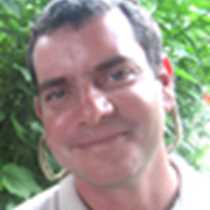Darwin’s Bay
Today we started anchored in a caldera of the Island of Genovesa, located on the northern area of the archipelago, and actually in the northern hemisphere. This morning we landed on Darwin’s Bay, which is a sandy beach is made of broken pieces of coral surrounded by the eroded cliffs of the caldera. This is the habitat of many species of seabirds. The place was packed by red footed boobies that were in their breeding season, the same as most of the marine wildlife at this time of the year. During the hike we learned about the unique conditions of Genovesa that created an environment without land reptiles - the reason why prickly pear cacti didn’t have the need to develop sharp spines to protect themselves against their main predator, land iguanas. We continued our hike all the way up to a couple of towers that worked as navigation aid on our way in the narrow channel to enter the caldera.
Shortly after arriving at the National Geographic Islander an adventurous group of snorkelers got ready to get in the choppy conditions in Genovesa. Snorkeling in those challenging water was great. The water visibility was good enough to see the wonders of the site. Moorish idols, parrots fish, damsel fish and other colorful fish were spotted in this adventure. But the best part was close to the end of our journey when a huge school of cow nose golden rays appeared from down below.
Later in the afternoon, the magical world hidden at Prince Philip´s steps was waiting for us. Since the very beginning of the visit, all the sea birds that nest in the area were singing a perfect natural melody to our ears. Nazca boobies nesting were part of the marvels that Mother Nature showed.
As we reached the other side of the cliff, we started to look for the main land predator of the area, the short-eared owl. We spend a lot of this searching for our objective but no luck. We found evidence of its presence in the area in the carcasses of their victims, pellets regurgitated made of feathers and bones, but not the owl itself. But after a while patience was rewarded. Short-eared owls appeared – not more than three of them hunting after Galápagos shearwater, but the experience was unbelievable. The expedition ended with a marvelous sunset which made us aware that paradise is on earth.




